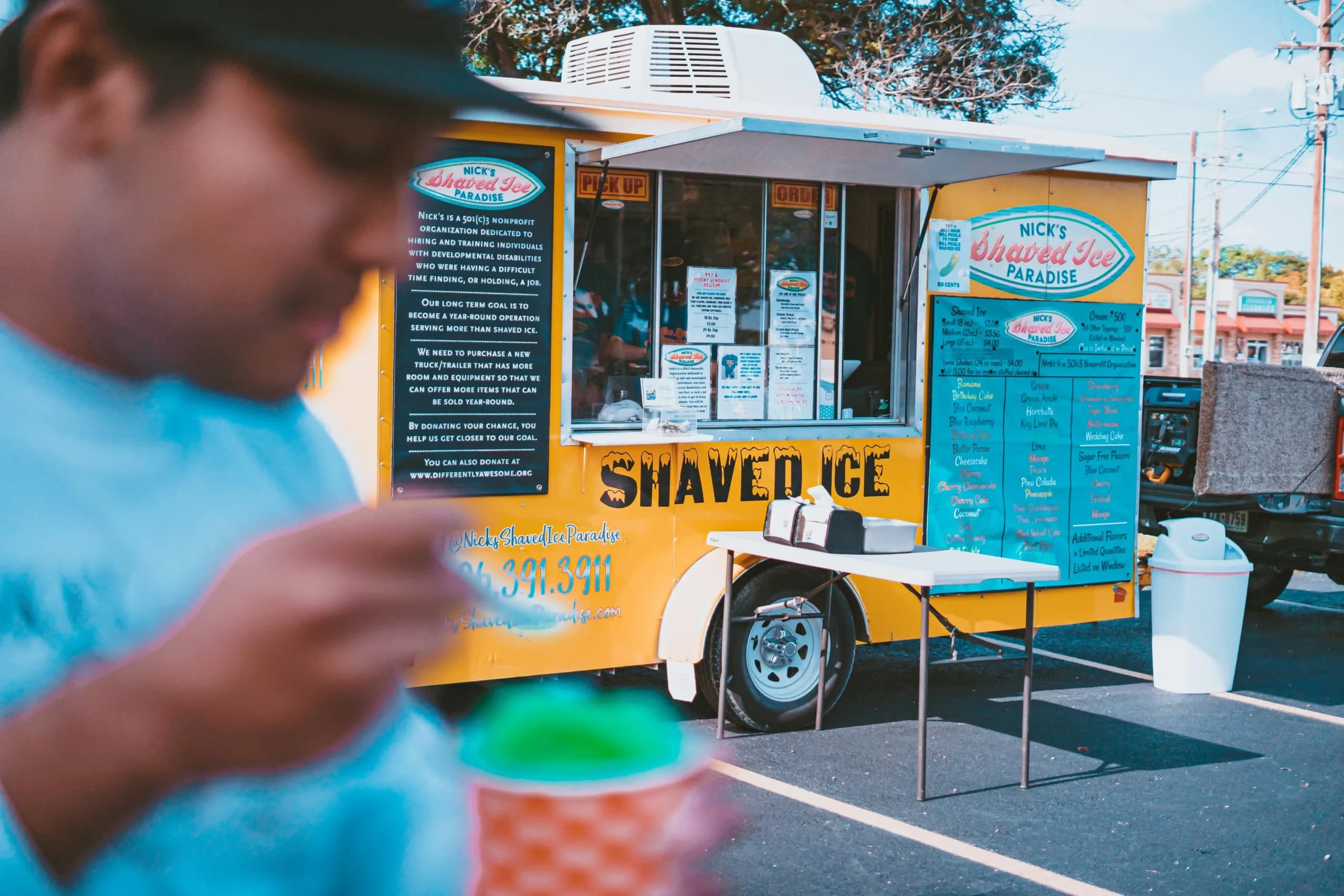Summary
Location: Rhode Island, USA
Rhode Island food trucks need state and city-specific licenses. At the state level, you’ll need permits for tax collection, food safety, and fire safety. Local requirements and rules on zoning and service hours vary, so research your specific city’s regulations.
Key provisions to remember:
- Operators must keep a gas log on board
- Food trucks must keep hot foods at 135°F or above, and cold foods at 41°F or below
- Trucks in Cranston must park 300+ feet away from restaurants, churches, and schools
- Providence food trucks are not allowed to serve between 2 a.m. and 6 a.m.
- Warwick only offers daily licenses costing $50 per day
Just like other places, Rhode Island requires food truck operators to obtain state and city licenses to operate legally. What’s unique about the Ocean State is that each state-level permit must be completed in a specific order before you can even apply for local licenses. So before firing up the grill, you’ll need to check off each requirement in the right order.
1. RI Business Application and Registration (BAR)
Before your food truck can hit the road in Rhode Island, you’ll need to apply for a Business Application and Registration (BAR) through the RI Division of Taxation. This step gives your business the green light to collect and send sales tax to the state. It’s basically a seller’s permit, which is required before you can legally sell food or drinks from your truck.
To apply, you’ll need to have your EIN (Employer Identification Number) from the IRS, your business name, and details about your food truck business plan and structure. For example, you should confirm whether you’re an LLC or a sole proprietorship. If you’re not sure what structure is right, it’s a good idea to talk to an accountant or legal expert first.
This permit is the first in a line of licenses and permits you’ll need before opening your food truck in Rhode Island. In fact, without this permit, you can’t move forward with your Mobile Food Establishment (MFE) registration, MFE permit, or even apply for local licenses like the completed municipal application required in Providence and other cities.
The cost varies depending on your business setup, but it’s usually built into the online filing fee. Once submitted, your application will be reviewed by the Rhode Island Division of Taxation, and you’ll receive confirmation that you’re officially registered to do business.
2. Mobile food service license
You also need a mobile food service license from the Rhode Island Department of Health (RIDOH). It’s required before you can complete your MFE registration and move on to local licenses and permits.
Submit your application to RIDOH, including your menu, your commissary kitchen details, and your food suppliers. The license fee costs $100 per year. Once your paperwork is in, you’ll schedule a health inspection, which can take two weeks or more to book.
As part of the inspection, RIDOH will check your food truck floor plan, which should include a three-bay sink, a working handwashing station, and thermometers. You must also have a Certified Food Safety Manager on staff (if you’re cooking hazardous foods). Additionally, hot food should be kept at 135°F or above, and cold food at 41°F or below.
Before your scheduled inspection, it’s smart to run a self-audit. Check your temps, clean your gear, and walk through the food safety checklist. Missing even one required item can mean a failed inspection, which can lead to delays.
3. Fire Marshal’s MFE inspection certificate
In Rhode Island, the state fire inspection is required for any mobile food unit that cooks or uses heat. That includes food trucks, truck trailers, and even mobile carts that use propane, natural gas, a generator, or any kind of commercial kitchen equipment. This permit proves your truck meets Rhode Island’s fire safety rules.
To get started, you’ll need to schedule the inspection with the state fire marshal at least seven business days ahead of time. Don’t wait until the last minute since slots can fill up fast, especially during busy seasons. If your truck fails the inspection, you’ll need to schedule a re-inspection, which will cost you another $100.
To pass, your truck must follow specific Rhode Island safety requirements. This includes installing a UL 1484-rated Propane/LPG Gas Alarm. All gas connections must also be tested before every use, and you must keep a log on board showing when gas lines were tested.
4. Mobile Food Establishment (MFE) registration
The Mobile Food Establishment (MFE) registration is the main license you need from the Rhode Island Department of Business Regulation (DBR) to legally run your food truck in the state. Without this permit, you won’t be able to operate or apply for city permits.
Take note that you can’t apply for this registration until you have three other things in hand:
- Your RI retail sales permit (tax ID for selling food)
- Your mobile food service license from the health department
- Your Fire Marshal’s MFE inspection certificate
Once you’re ready, submit your application through the RI e-Permitting portal. If you run more than one food truck or truck trailer, each one needs its own MFE registration. The cost is $50 per vehicle.
5. Motor vehicle registration & insurance
Every food truck operating in Little Rhody needs to have a valid vehicle registration and insurance before hitting the road. Register your truck through the Rhode Island Division of Motor Vehicles (RI DMV). It must be legally registered in your name or business name.
Along with that, you’ll need to carry proof of insurance that covers your vehicle for both property damage and liability. This helps protect your business in case of an accident or equipment loss.
If you’re running a food boat instead of a truck, your process goes through the RI Department of Environmental Management (RIDEM). You’ll need a valid vessel registration and a marine insurance policy that meets Rhode Island’s safety standards.
While this isn’t a food-related permit like your health department or fire inspection license, it’s just as important. Always keep both digital and printed copies of your registration and insurance with you in the truck. City inspectors, event organizers, or police officers may ask to see them at any time.
City-specific food truck permits
Once you’ve taken care of your state licenses, it’s time to tackle local permits. Every Rhode Island city or town has its own rules for food trucks, and you’ll need to apply for a permit in each place you want to operate.
Local permits can cover zoning rules, hours of operation, parking limits, and distance from restaurants or schools. For a completed municipal application, you may need proof of insurance, your MFE registration, or copies of your health department paperwork.
Cranston
In Cranston, every food truck must have a local permit to operate within city limits. They must park at least 300 feet away from restaurants, churches, and schools, with 4-hour maximum stay per legal parking spot. Overnight street parking and residential parking for trucks over one ton aren’t allowed.
To apply, you must visit Cranston City Hall directly. Food trucks are not included in the city’s general commercial licensing pack, so don’t use the standard forms. Annual fee is $75 per truck, with a maximum of $250 for multiple trucks.
Providence
You need permission from the city government to operate in Providence, which is only issued after you’ve completed your state paperwork. Unique proximity rules include no parking within 200 feet of restaurants and within 300 feet of entertainment venues. You can’t serve between 2 a.m. and 6 a.m. as well.
Prepare your state-level licenses and contact the City of Providence Office of Economic Opportunity to start the process.
Warwick
Warwick takes a different approach. Instead of an annual permit, the city offers daily licenses designed for events and pop-ups. It costs $50 per day. If you’re vending at a city-sponsored event, you must provide a Certificate of Insurance for at least $1 million, naming Warwick as an additional insured. This is ideal for food trucks looking to serve at festivals, pop-up markets, or special community events in Warwick.
When to renew your Rhode Island food truck licenses
Once you have the necessary licenses and permits, you need to keep track of renewals. Use a checklist or chart and set reminders, since most expire annually, making it easy to forget about them.
| Permit or requirement | Who issues it | Renewal timeline | Notes |
| Business Application and Registration (BAR) | RI Division of Taxation | As needed (update if info changes) | Required to collect and remit sales tax; first step before applying for other permits. |
| Mobile food service license | RI Department of Health (RIDOH) | Annually | Includes inspection of kitchen layout and food safety setup |
| Fire Marshal’s MFE inspection certificate | Office of the State Fire Marshal | Annually | Required if using gas, generator, or commercial cooking |
| Mobile Food Establishment (MFE) registration | RI Department of Business Regulation (DBR) | Annually | Main state license to operate a food truck; requires a BAR, RIDOH license, and fire certificate first. |
| Vehicle registration and insurance | RI Division of Motor Vehicles (RI DMV) | Annually | Must be registered in your business name; required to legally operate your truck on public roads. |
| Food boat registration (if applicable) | RI Department of Environmental Management (RIDEM) | Annually | Applies only to food boats; separate process through RIDEM. |
There are also city-specific licenses to remember. It’s important to check if the place you plan on operating in has special regulations you should follow.
| Permit or requirement | Who issues it | Renewal timeline | Notes |
| Cranston | Cranston City Hall | Annually | Permit required; must park 300 ft from schools, churches, and restaurants; 4-hour parking limit. |
| Providence | City of Providence Office of Economic Opportunity | Annually | No parking near restaurants and entertainment venues, 2 a.m. to 6 a.m. operations not allowed |
| Warwick | Warwick City Government | $50/day | Permit is event-based; must submit a $1M insurance certificate naming Warwick as additional insured. |
Get your requirements in order before your first shift
Food truck operators in Rhode Island must follow a specific order when applying for local licenses. Start by registering your business, then get your EIN through the IRS. With that in place, you can then apply for your RI Retail Sales Permit, which allows you to legally sell food and collect tax.
Next, complete your mobile food service license application with the RIDOH and set up a commissary kitchen. Once that’s submitted, schedule your fire safety inspection through the fire marshal’s office.
Avoid costly delays or, worse, being shut down before you even start serving. The sooner you get licensed, the sooner you can get cooking.
When those are approved, you can apply for your MFE Registration through the RI e-Permitting Portal. After that, register and insure your vehicle, and apply for each local permit in the cities or towns where you plan to operate, like Providence, Cranston, or Warwick.
You’ve worked hard to get your licenses, permits, and paperwork in order, so don’t let the day-to-day drag you down. Use restaurant scheduling software to save hours each week and reduce last-minute scrambles. 7shifts lets you build and share schedules in minutes and stay in sync with your crew to maximize efficiency.

Rebecca Hebert, Sales Development Representative
Rebecca Hebert
Sales Development Representative
Rebecca Hebert is a former restaurant industry professional with nearly 20 years of hands-on experience leading teams in fast-paced hospitality environments. Rebecca brings that firsthand knowledge to the tech side of the industry, helping restaurants streamline their operations with purpose-built workforce management solutions. As an active contributor to expansion efforts, she’s passionate about empowering restaurateurs with tools that genuinely support their day-to-day operations.
